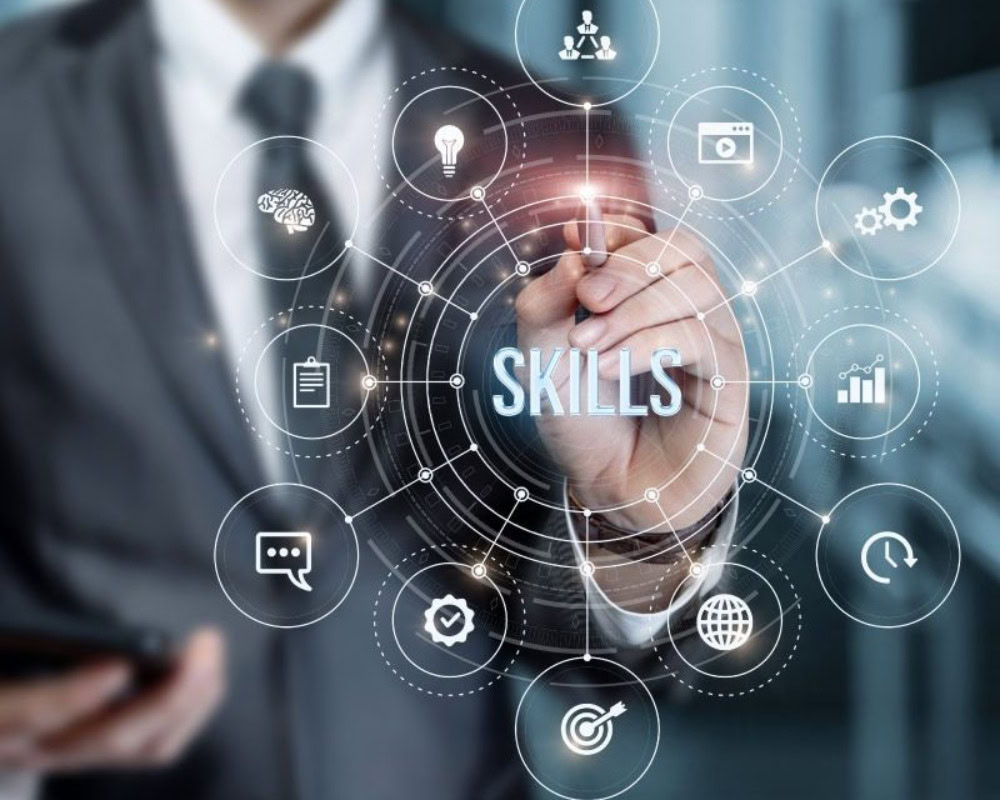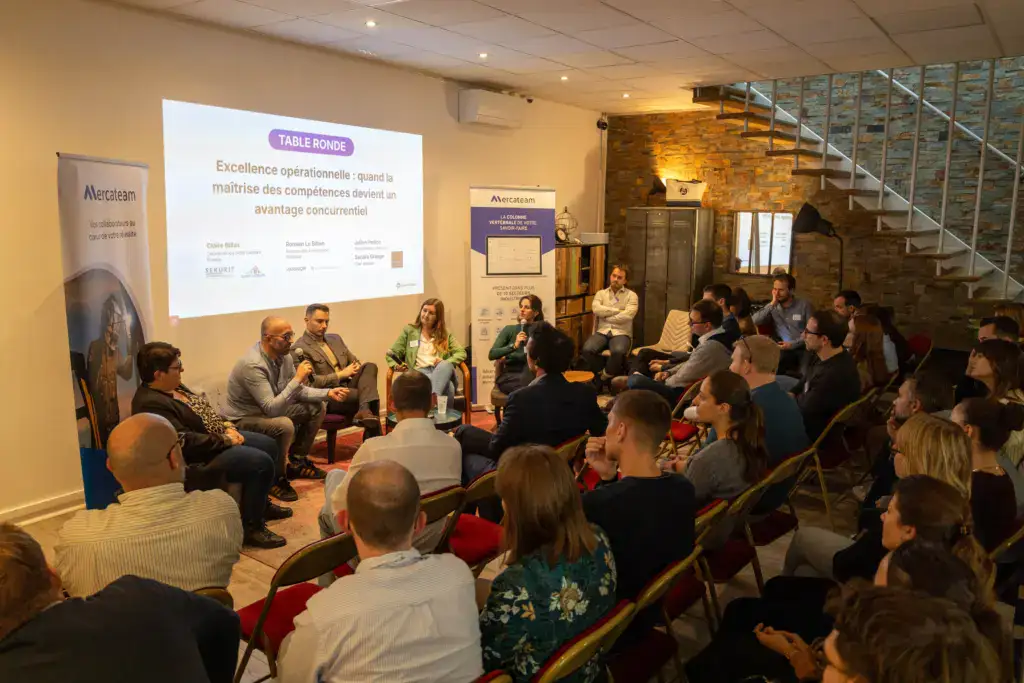Introduction: Why is skills assessment vital to industrial excellence?
An overview of skills assessment: Definition and importance
L'skills assessment is not just an HR procedure; it's a strategic driver for any industrial company striving for excellence. By defining and measuring competencies, the company not only maps out the skills of its employees, but also draws up a roadmap for its human capital, essential to its performance and development.
These skills assessments enable us to understand not only where the company excels, but also where it can improve, thus aligning individual skills with the company's overall vision. They are the assurance of a skilled workforce, ready to meet the technological and competitive challenges of modern industry.
Aligning skills and aspirations: the key to a high-performance industry
Aligning skills and aspirations isn't just about filling jobs. It's an ongoing dynamic that fuels innovation and responsiveness in an ever-changing industry. By identifying and developing key skills, while taking into account employees' career aspirations, industrial companies cultivate deep commitment, improved talent retention and enhanced performance.
This process creates an environment where employees feel valued and where their skills are fully exploited, which in turn fuels the company's growth and competitiveness.
Understanding Skills Assessment: Between Hard Skills and Soft Skills
Hard Skills: Measuring technical expertise
Hard skills are the backbone of the industry. They include everything that is measurable and certifiable: engineering knowledge, mastery of specific machines, IT skills, and much more. Assessing hard skills ensures that the team has the necessary qualifications to operate safely and efficiently.
It's the foundation on which product quality and innovation are built. In times of rapid technological change, regular assessment of hard skills ensures that the company remains at the cutting edge, ready to integrate new methods and technologies.
Soft Skills: The growing importance of interpersonal skills
While hard skills are essential, soft skills, or interpersonal skills, are what enable an organization to navigate and adapt to change. They include communication, leadership, resilience, critical thinking and the ability to work as part of a team. In a complex, collaborative industrial environment, soft skills facilitate innovation, problem-solving and a culture of continuous improvement.
In the age of Industry 4.0, where man-machine collaboration is becoming the norm, these skills help create harmonious interfaces between technologies and teams, boosting organizational efficiency and flexibility.
In-plant skills assessment is therefore a holistic approach, encompassing both the technical and human aspects of performance. It is an essential strategy for any company striving for excellence in a competitive and fast-changing industry.
Evaluation strategies: How to measure effectively?
Performance Assessments: Observation and Practical Tests
Performance assessment through observation and practical testing is a cornerstone of industrial skills assessment. Through direct observation, supervisors and trainers can assess the technical mastery, efficiency and safety with which tasks are performed. Practical tests, meanwhile, place employees in real or simulated work situations to assess their ability to apply their knowledge and skills in practice.
These methods enable a precise and objective assessment of hard skills, and are essential for ensuring a competent workforce ready to meet the demands of modern production.
360-degree assessments: A holistic view of performance
360-degree appraisal is a comprehensive method that gathers feedback on an employee's performance not only from supervisors, but also from peers, subordinates, and sometimes customers or suppliers. This multi-source approach offers a richer, more diversified perspective on an employee's skills and behavior.
It measures both hard and soft skills, encouraging a culture of continuous feedback and personal development. 360-degree assessments also foster commitment and accountability, by involving the entire work ecosystem in the assessment process.
The importance of appraisal interviews
Appraisal interviews are key moments in the skills management cycle. They provide an opportunity for constructive dialogue between employee and supervisor, focusing on past performance, future objectives and development needs.
These interviews encourage personal reflection and professional development by helping employees understand how their skills align with the company's objectives, and by identifying opportunities for training and improvement. They are essential for strengthening employee alignment and commitment to organizational objectives.
Modernizing the Assessment Process with Technology
Integration of Learning Management Systems (LMS)
Learning Management Systems (LMS) are technological tools that are revolutionizing the way skills are assessed and developed in industry. They enable continuous training and assessment, providing personalized learning paths based on individual skills assessments.
LMSs also facilitate real-time progress monitoring and analysis, enabling a rapid response to training needs. By centralizing learning resources, they make training more accessible and consistent across the organization.
Data analytics and Big Data for proactive assessment
Leveraging data analytics and Big Data transforms skills assessment into a proactive, predictive process. By analyzing real-time performance and historical trends, companies can anticipate training needs before a gap becomes a problem.
This approach enables training and development programs to be adjusted to keep pace with technological developments and the company's strategic objectives, ensuring a workforce that is always competent and ready to meet future challenges.
Virtual and Augmented Reality: Towards immersive training courses
Virtual reality (VR) and augmented reality (AR) are opening up new avenues for immersive training and skills assessment. By creating simulated environments, these technologies enable employees to practice and develop their skills in realistic contexts without the risks associated with a real production environment.
They also offer the possibility of measuring skills in specific, complex situations, making assessment more accurate and relevant. Total immersion fosters an engaging and effective learning experience, reinforcing employees' skills and confidence.
Developing and using a Skills Assessment Grid
Designing a Skills Assessment Grid: What you need to know
A skills assessment grid is a structured tool designed to measure and compare an individual's skills against the specific requirements of a job or task. The design of this grid involves determining the key skills required for each role in the company, whether technical, managerial or behavioral.
Each skill is then assessed according to a mastery scale, providing an objective assessment of current level and potential for improvement. To be effective, the grid must be clear, concise and adapted to the company's specific culture and objectives. It must also be regularly reviewed and updated to reflect changing roles and technologies.
Software programs let you your skills matrices automatically.
Practical example: Evaluation grid in action
Let's imagine an evaluation grid for a machine operator in a factory. The skills assessed might include technical mastery of the machine, knowledge of safety procedures, ability to diagnose and solve common problems, and collaboration with colleagues.
Each skill would be rated on a scale, for example from 1 (beginner) to 5 (expert), and development objectives would be defined for each level. The use of this grid during appraisals would enable training and progression needs to be precisely targeted for each employee, while providing a clear basis for discussions during appraisal interviews.
Competency Development Planning
Identifying gaps: Strategies for a customized training plan
Once current skills have been assessed, it's crucial to identify gaps and plan how to fill them. This starts with an analysis of the assessment results, comparing current skills with the desired skills for each position.
The gaps identified become the priority targets for development, leading to the design of customized training plans. The aim is to provide development opportunities that not only fill gaps, but also motivate and engage employees in their career paths.
Fostering a Culture of Continuous Feedback and Improvement
The vital role of feedback in improving skills
Continuous feedback is a crucial element in the industry's culture of learning and improvement. It enables employees to understand how their actions affect the team and the company, while highlighting areas of success and those requiring further development. Regular constructive feedback motivates employees to improve their skills and adapt to necessary changes.
To be effective, feedback needs to be a two-way communication, where employees feel free to express their ideas and concerns. Encouraging a culture where feedback is valued also means training managers to give and receive feedback effectively and empathetically.
Adopt a continuous improvement approach
Continuous improvement is a commitment to the ongoing optimization of processes, products and skills. It requires regular assessment of current practices and the adoption of innovative approaches to solving problems and exploiting opportunities. By integrating methodologies such as PDCA (Plan-Do-Check-Act) or Six Sigma, companies can systematize continuous improvement and make skills development an integral part of their operational strategy.
This encourages not only efficiency and quality, but also an environment of continuous learning and development.
Looking to the Future: Innovations and Trends in Skills Assessment
Gamification and Mobile Learning: The Future of Training
Gamification and mobile learning are revolutionizing the way skills are developed and assessed. By making learning more interactive, engaging and accessible, these technologies increase motivation and learning effectiveness. Serious games and simulations enable employees to practice skills in a risk-free environment, while mobile learning offers the flexibility to learn anytime, anywhere, tailoring education to individual pace.
These innovations are not just tools for developing skills, but ways of making lifelong learning an integral part of corporate culture.
Intercultural skills and diversity: Broadening horizons
In a globalized market, intercultural skills and diversity management are becoming increasingly important assets. Understanding and appreciating cultural, linguistic and social diversity not only enriches the working environment, but also opens up opportunities in international markets.
Encouraging employees to develop intercultural skills and adopt a global perspective can improve communication, collaboration and innovation within diverse teams, while enhancing the company's reputation as an inclusive, global workplace.
Conclusion: Skills Assessment as a Lever for Industrial Performance
Summary of best practices
Skills assessment plays a key role in industrial performance, acting as a catalyst for professional development and operational excellence. By adopting a holistic approach, integrating both hard and soft skills, and modernizing assessment methods with technology, companies can not only measure but also constantly improve the skills of their workforce.
A culture of continuous feedback and improvement, as well as the adoption of pedagogical innovations, are essential to maintaining a competitive workforce ready to meet future challenges.
How Mercateam can transform your skills assessment
Mercateam is at the forefront of the transformation of skills assessment, offering solutions that incorporate best practices and the latest innovations. By working with Mercateam, your company can not only improve its assessment methods, but also adopt a culture of continuous learning and development.
Together, we can put in place systems that not only assess skills but enrich them, ensuring that your workforce remains competent, motivated and efficient. Find out how Mercateam can help you get a head start in skills assessment and development.




